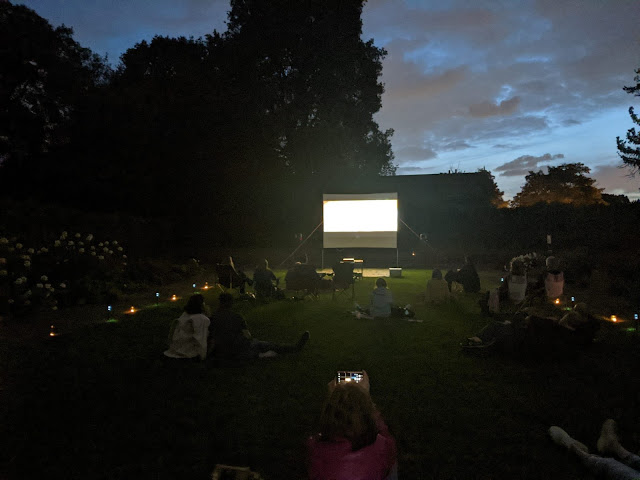 |
| Pic credit: Dean Leggett |
I help run a free film festival in Greenwich (specifically the Charlton and Woolwich Free Film Festival)
and every year when preparing the listings I try and keep the following
things in mind. My aim is to make it easy for people to know what to
expect at our screenings and either reduce or at least draw attention to
any barriers.
1. Subtitles / captions
If a film screening can be subtitled then that helps to include people who are d/Deaf or who have a degree of hearing loss or audio processing difficulties. Those difficulties can also be exacerbated by the acoustics of the venue.
Even people with good or perfectly adequate hearing (me!) can pick up extra stuff they'd not even realised they'd missed. For me it helps solidify how place or character names are spelled which generally helps me remember and know what's going on.
Subtitles do exclude people who find them a visual distraction though. They also tend to appear on-screen just before the character speaks them, so can ruin the joke or flow a bit.
It's fine to have no subtitles but the most important thing is to state whether a film will have them or not. Just let people know.
Also if you are subtitling a film that gives you access to another advertising venue: http://yourlocalcinema.com/
In my own listings I've used the "Regional Indicator Symbol Letter S" to denote subtitled events 🇸
2. ♿️ Wheelchair accessibility: venue and loos
A venue may be wheelchair accessible but if the screening room is upstairs and there's no lift... not so much. If possible visit the venue yourself and see but if you are able-bodied you may miss some subtle things that seem fine but which might be a barrier or annoyance to someone using a wheelchair. A good website to check a venue's accessibility is https://www.accessable.co.uk/ - with information gathered by people who've visited a site and know what to look out for.
For a film screening many people can manage the couple of hours duration without needing a loo, but others will need to know the loo situation, particularly if coming from work or elsewhere. It's a helpful kindness to say in your advertising blurb if there is only a standard loo or if it's accessible. Emojis are a quick shorthand but do also write it out for users of screenreaders.
♿️ 🚽 ❌
♿️ 🚽 ✅
3. Different exits?
This one is my pet peeve and I've been to two events which caused me a bit of stress on leaving as I'd not been aware before the screening that we'd all be leaving a park by a different gate from the ones we'd come in by.
Open air park screenings are fantastic but parks often close during the screening and everyone is shuttled through a single exit. This can be a bit of an unpleasant surprise. Sometimes there's a financial cost too, e.g. I can walk into the top of Greenwich Park and walk home from the same gate, but if we're all leaving by Cutty Sark at the bottom that's a bus ride home or a longer walk up a steep hill. Fine, but helpful to be able to plan for this (particularly, I would assume, for people using wheelchairs).
Also for me personally, having no sense of direction I prefer to know exactly where I'm heading for on leaving and can't necessarily guarantee a good signal to get that info from the CityMapper app!
4. What3Words location markers
These are super helpful for outdoor events where people might need to know the location of any preferred (nearest, or where the ticket-checkers are) entrance, the exit and the actual screening area if a walk is involved. Adding a link to the Google Maps map is also very helpful as people can zoom in and see what the nearest bus stops are, plus other transport options or nearest car park.
This one will give you a nice view of the row of cherry trees in April: stay.path.wizard
